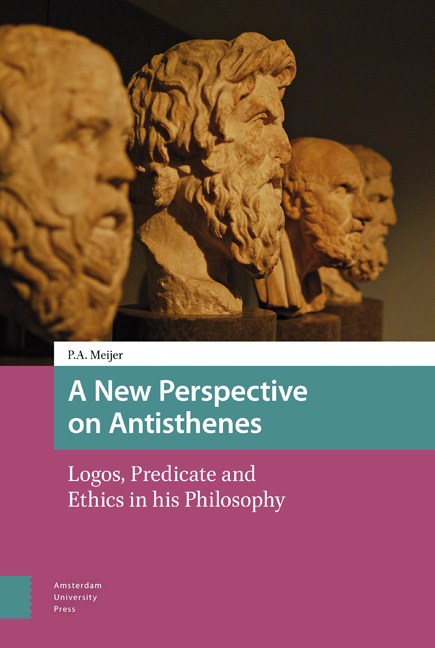Book contents
- Frontmatter
- Dedication
- Contents
- Preface
- Abbreviations
- Primary Sources – Editions Used
- Introduction
- Part I LOGOS AND PREDICATE
- Part II ANTISTHENES’ VIEWS ON THEOLOGY: HIS THEORETICAL APPROACH TO THE STUDY OF HOMER
- Part III ANTISTHENEAN ETHICS
- Epilogue: Antisthenes, an Assessment
- Appendix II The Speeches of Ajax and Odysseus
- Bibliography
- Concordance Giannantoni (SSR) – Caizzi (D.C.)
- Index
Introduction
Published online by Cambridge University Press: 24 December 2020
- Frontmatter
- Dedication
- Contents
- Preface
- Abbreviations
- Primary Sources – Editions Used
- Introduction
- Part I LOGOS AND PREDICATE
- Part II ANTISTHENES’ VIEWS ON THEOLOGY: HIS THEORETICAL APPROACH TO THE STUDY OF HOMER
- Part III ANTISTHENEAN ETHICS
- Epilogue: Antisthenes, an Assessment
- Appendix II The Speeches of Ajax and Odysseus
- Bibliography
- Concordance Giannantoni (SSR) – Caizzi (D.C.)
- Index
Summary
Antisthenes’ status
Antisthenes, a follower of Socrates and a rival of Plato, did not like democracy very much. On one occasion, he ridiculed the practice of voting, advising the Athenians to elevate donkeys to horses by voting. The Athenians considered this advice, to say the least, foolish. However, Antisthenes explained it by adding further insult: ‘But among you there are generals who have not learned anything but have been elevated to the rank of general only by voting’.
This anecdote shows that Antisthenes was a witty philosopher, an outspoken character, and a rude fellow who enjoyed surprising his interlocutors. When someone once remarked that many people praised him, he retorted: ‘Why, what did I do wrong?’ It is important to note his rudeness as well as his surprising reversals of established opinion because many fragments are marked as authentic precisely on account of these characteristics. These fragments often contain short, pithy statements that were very apt for quotation and in this way found their way into the tradition; but we shall see that he was also very capable of argument in a strictly philosophical manner. This study will also demonstrate that the pithy one-liners were often mitigated in his theoretical discussions or in further statements of his personal views. Such slogans, then, were meant to be provocative and to draw attention to his views, and this explains the imbalance in relation to Antisthenes’ other utterances.
With regard to his historical reception, Antisthenes has suffered quite a run of bad luck. According to Popper, Antisthenes was the only worthy successor to Socrates, the last of the ‘Great Generation’. Although his intellectual status in his own day was high, his social class was low: his father was a dealer in salt fish and his mother of non-Athenian descent, a Thracian by birth. The prominent rhetor Isocrates wrote twice against his rivals (Against the Sophists [13] and the Helena [10]), presumably at the opening of his school in 393 B.C. or just after that, and the first rival hinted at in the Helena is Antisthenes, ranked before Plato and others. It would seem that at that time Plato was less known or less important, perhaps still at the beginning of his philosophical career and not yet having developed his doctrine of the Ideas.
- Type
- Chapter
- Information
- A New Perspective on AntisthenesLogos, Predicate and Ethics in his Philosophy, pp. 21 - 26Publisher: Amsterdam University PressPrint publication year: 2017



